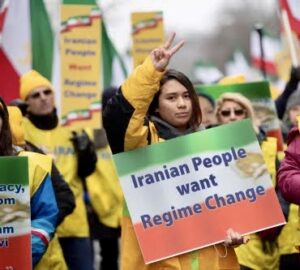For Israel, a country much smaller than America’s Lake Michigan, nuclear weapons and nuclear strategy remain integral to national survival. The murderous terrorist attack of Oct. 7 by Hamas, coupled with daily rocket strikes into Israel from Gaza and from Hezbollah in Lebanon and constant threats by Iran to destroy it, shines a light on how Israel’s nuclear strategy requires an update and might be optimized for deterrence.
Israel’s nuclear program goes back to early days of the nation. During the 1950s, David Ben-Gurion, Israel’s first prime minister, understood the need for a dramatic “equalizer” against much larger and more populous regional enemies. He sought to secure his country’s fragile existence in a world of continuous anarchy and prospective chaos, recognizing that appropriate nuclear assets could be critical to Israel’s survival.
Today, the arsenal remains critical to its survival. But for Israeli military strategists, “appropriate” requires an update. It should mean a nuclear capacity that is not too destructive (i.e., not oriented to threats of massive retaliation) and that is no longer deliberately ambiguous.
Without an update, Iran and other potential state adversaries could have serious doubts about Israel’s capacity to calibrate nuclear retaliations to different levels of attack. Moreover, an update is needed to convince Iran and other potential foes that Israel’s nuclear weapons are sufficiently invulnerable to first-strike attacks and that these weapons are capable of penetrating the attackers’ system of ballistic missile defense. Finally, the overall strategic balance in the Middle East is shifting away from Israel’s favor, and the need for Ben-Gurion’s “equalizer” is greater than ever.
In the atomic era’s “good old days,” a time in the 1950s and 1960s when Americans and Soviets were busily defining a bipolar Cold War nuclear strategy, Israel had nowhere to turn for a history-based policy guidance. What Jerusalem did understand is that nuclear ordnance can succeed only through rationally calibrated policies of intentional non-use. This seemingly paradoxical understanding represented a contemporary reaffirmation of classical Chinese strategist Sun-Tzu: “Subjugating the enemy’s army without fighting is the true pinnacle of excellence.”
Deterrence only works to the extent that potential aggressors are able to calculate that the expected costs of striking first will exceed expected gains. This form of systematic reasoning generally relates to all manner of violent conflict.
The array of foes faced by Israel
Israel’s designated adversaries should always be considered rational and ought usually to be nation states. At times, however, certain adversaries could act irrationally, and certain states could operate in alliance with other states or kindred terror groups. As a foreseeable example, Israel’s enemies could include state or sub-state foes preparing to target the country’s Dimona nuclear reactor. For the moment, of course, such targeting would be carried out with non-nuclear weapons.
Unless Israeli analysts were to consider Pakistan as an authentic national foe (implausible, but possible), Israel has no already-nuclear enemies. Yet, as an unstable Islamic state, Pakistan is potentially subject to a coup d’etat by insidious jihadist elements and is closely aligned with Saudi Arabia. Of course, non-Arab Iran leads a widening array of heavily armed Shiite proxies and militias and is closely aligned with nuclear-armed North Korea.
A nuclear strategy that should change
For nuclear deterrence to work long-term, Israel must change its strategy — would-be aggressor states such as Iran would need to be told more rather than less about Israel’s nuclear targeting doctrine and about the expected potency and invulnerability of Israel’s nuclear forces. Without revealing more about its willingness and capacity to use nuclear weapons in retaliation, Israel might not have adequate nuclear credibility.
However counterintuitive, this means that to best prepare for all plausible attack scenarios, Israel should plan conscientiously for the incremental replacement of “deliberate nuclear ambiguity” with selective levels of “deliberate nuclear disclosure.”
In concert with such core policy changes, Jerusalem will need to refine its still undisclosed and opaque “Samson Option,” a last resort deterrence strategy of massive retaliation with nuclear weapons if Israel is under attack and threatened with imminent destruction.
How deterrence might fail
Though the only gainful purpose of Israel’s nuclear weapons should be deterrence at foreseeably different levels of military destructiveness, there will still remain residual circumstances under which Israeli nuclear deterrence could fail. How might such intolerable circumstances arise?
Four comprehensive though not mutually exclusive scenarios come to mind. In these dialectical scenarios, the term “enemy state” is used because it includes not only Shiite Iran, Israel’s current existential foe, but also such potentially nuclear Sunni states as Egypt and Saudi Arabia. In addition, this term could allow informed considerations of Pakistan and North Korea.
Nuclear retaliation
Should an enemy state or alliance of states launch a nuclear first-strike against Israel, Jerusalem would respond, to whatever extent possible, with a nuclear retaliatory strike. If enemy first-strikes were to involve other available forms of unconventional weapons such as chemical or biological weapons of mass destruction, Israel might then launch a nuclear reprisal. This decision would depend upon Jerusalem’s expectations of any follow-on enemy aggression and on its associated calculations of comparative damage-limitation.
If Israel were ever to absorb a massive conventional attack, a nuclear retaliation could not automatically be ruled out, especially if the state aggressors were perceived to hold nuclear or other unconventional weapons in reserve; and/or Israel’s leaders believed that non-nuclear retaliations could not prevent annihilation of the Jewish state.
A nuclear retaliation by Israel could be ruled out only in those rapidly decipherable circumstances where enemy state aggressions were clearly conventional, consistent with all previous instances of enemy attack in both degree and intent and hard-target oriented– directed towards Israeli weapons and military infrastructures rather than toward its civilian populations.
Nuclear counterretaliation
Should Israel ever feel compelled to preempt enemy state aggression with conventional weapons, the target state’s response would determine Jerusalem’s next moves.
If this response were in any way nuclear, Israel would doubtlessly turn to certain available forms of nuclear counter retaliation. If the enemy state retaliation were to involve non-nuclear weapons of mass destruction, Israel still could feel pressed to take the escalatory initiative. This decision would depend upon Jerusalem’s considered judgments of enemy intent and upon its corollary calculations of essential damage-limitation.
Should the enemy state response to Israel’s preemption be limited to hard-target conventional strikes, it is unlikely that decision-makers would then move to nuclear counter retaliations. But if the enemy conventional retaliation was “all-out” and directed toward Israeli civilian populations as well as to Israeli military targets, an Israeli nuclear counter retaliation could not be excluded.
Such a counter retaliation could be ruled out only if the enemy state’s conventional retaliation were identifiably proportionate to Israel’s preemption; confined to Israeli military targets; circumscribed by the legal limits of “military necessity” and accompanied by explicit and verifiable assurances of non-escalatory intent.
Nuclear preemption
It is highly implausible that Israel would ever decide to launch a preemptive nuclear strike. Though circumstances could arise wherein such a strike would be rational and permissible under authoritative international law, it is unlikely that Israel would ever allow itself to reach such dire circumstances.
Moreover, unless the nuclear weapons involved were usable in a fashion still consistent with the longstanding laws of war, this most extreme form of preemption could represent an egregious violation of binding international law.
Even if such consistency were possible, the psychological and political impact on the world community would be far-reaching. This means that an Israeli nuclear preemption could be expected only:
- Where Israel’s pertinent state enemies had acquired nuclear and/or other weapons of mass destruction;
- Where these enemies had made it clear that their intentions paralleled their capabilities;
- Where these enemies were believed ready to begin an operational “countdown to launch,” and
- Where Jerusalem believed that Israeli non-nuclear preemptions could not possibly achieve minimum levels of damage-limitation – that is, levels consistent with physical preservation of the state.
Nuclear warfighting
Should nuclear weapons ever be introduced into any conflict between Israel and its enemies, either by Israel or by a conspicuous foe such as Iran, nuclear warfighting, at one level or another, could ensue.
This would hold true so long as:
- Enemy first-strikes would not destroy Israel’s second-strike nuclear capability;
- Enemy retaliations for an Israeli conventional preemption would not destroy the Jewish state’s nuclear counter-retaliatory capability;
- Israeli preemptive strikes involving nuclear weapons would not destroy enemy state second-strike nuclear capabilities; and
- Israeli retaliation for conventional first-strikes would not destroy the enemy’s nuclear counter-retaliatory capability.
This means that in order to satisfy its most fundamental survival imperatives, Israel should take appropriate steps to ensure the likelihood of the first two bullets above and the simultaneous unlikelihood of latter two.
For Israel, a country without meaningful strategic depth, the most primal and consequential battlefield should be “mind centered.” More precisely, if all goes according to science-based strategic planning, there will need to be diligent considerations of enemy rationality and recognizable policy shifts to selective nuclear disclosure.
Without meeting such urgent intellectual prerequisites, a catastrophic conflict, whether nuclear, biological and/or conventional, could become more than just a shadowy possibility. It could become unavoidable.






